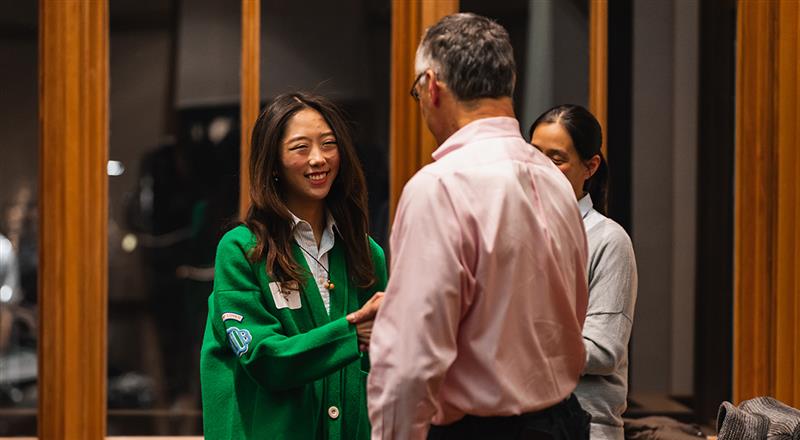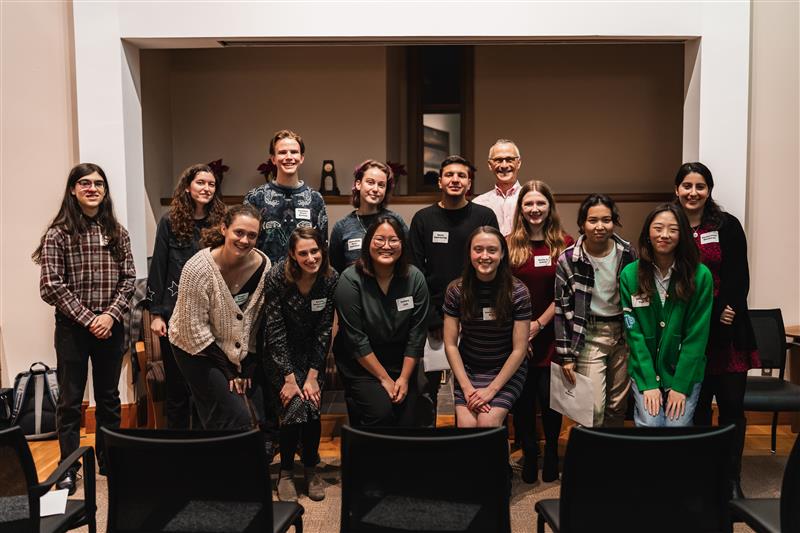Fifteen Students Inducted to Phi Beta Kappa

Wesleyan’s newest Phi Beta Kappa Society members plan to impact the world through service, research, policymaking, music, literature, and art.
There were 15 high-achieving Wesleyan students inducted into the Phi Beta Kappa Society at a ceremony in the McKelvey Room on Dec. 6, joining over 500,000 members from 293 campuses across the country. They join former presidents, members of Congress, and Nobel Laureates as part of the nation’s oldest scholastic honor society.
“It is really an impressive honor,” said Wesleyan President Michael S. Roth ’78, who is a member of Phi Beta Kappa. “It’s not just your grades, it’s not just that you worked hard or that you chose classes that allow you to get through the filter. It’s that you have shown an independence of mind and spirit, as we say in the mission statement of the university, and that you’ve excelled at the things we care about in the core of the academic program.”

Each of the 15 inductees were highly successful in their academics. To earn an induction students must be nominated by the department of their major, have completed their general education expectations, and must have an average grade of 93 or above.
“It’s really an honor to have been recognized and kind of affirm the importance of everything that we’ve been doing these past four years,” Emily Kabat ’24, a mathematics and physics double major, said.
Sabrina Tian ’24, an art history and East Asian studies double major, said it was an adjustment when she initially came to Wesleyan, but once she figured everything out she “fell in love with the academic rigor.”
“I’m really proud of myself. If you told me in freshman year that this is where I would be, I wouldn’t have believed you,” said Tian. She later added that she thinks she’s grown tremendously in her time here and has found what she loves to learn about.
Tian curated two exhibitions, Understanding China in the Age of the Unequal Treaties and Creating Space: Immaterial Bounds, in her over three years here. She is currently writing a thesis on the conceptual artist On Kawara and his relationship to his Japanese identity. Once she completes her degree, she plans to pursue a graduate program in art history of museum studies with the hope of one day working as a curator.
Darin Kamran Iraj ’24, a government and education double major, said he was proudest of his thesis—a combination of smaller projects and advocacy work he has done, he said. His thesis is a case study on the politics behind book challenges in Texas and how they’re affecting pedagogy in K-to-12 public schools.
“[Book challenges] always occurred, and they’ve risen unprecedentedly over the past couple of years,” Iraj said. “They have the potential to impact equity and inclusion in public schools, since we know diverse books are very important for the learning of all students, especially marginalized students.”
Once Iraj graduates in the spring, he plans to take a year before pursuing a combined law degree and MBA (Master of Business Administration), with the goal of becoming an education policy legal advocate either in government or in non-profits, he said.
Iraj, Kabat, and Tian are just three examples of the tremendous effort that this class of Phi Beta Kappa inductees has put into both their academic and outside work. Each of this semester’s inductees have undertaken unique and impactful exploits that have set them apart, which Associate Professor of Art History and Romance Languages and Literature Nadja Aksamija detailed by reading out each of their accomplishments during the ceremony.
New inductees into Phi Beta Kappa include: Thaddeus Moore Bashaw ’24, Emma Bella Bass-Lawrence ’24, Joe Champeau ’24, Debbra Goh ’24, Panzhi Flora Gu ’24, Darin Kamran Iraj ’24, Emily A Kabat ’24, Anne Foley Kiely ’24, Clara Grace Martin ’24, Amina Mednicoff-Misra ’24, Maggie Reese Monaghan ’24, Natalie Sell ’24, Sabrina Tian ’24, Rachel Hess Wachman ’24, Diana Zhumalieva ’24.

